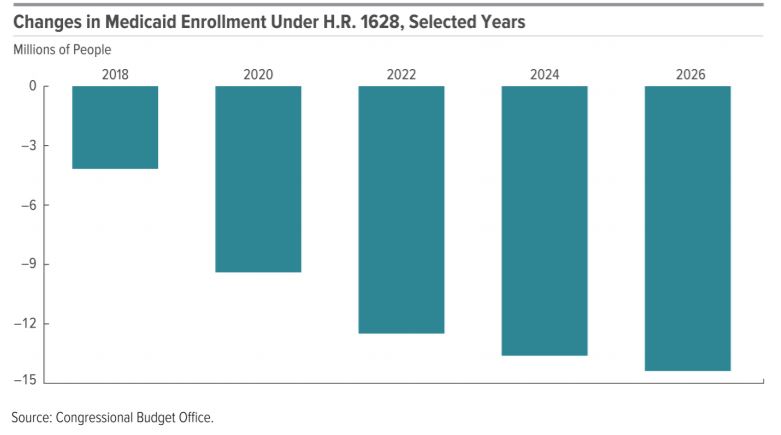The latest Congressional Budget Office (CBO) analysis of the House Republicans’ American Health Care Act (AHCA) could leave millions of Medicaid beneficiaries without health insurance in the coming years. When the Affordable Care Act was passed in 2010, the Obama administration included a provision to expand Medicaid to single, able-bodied adults who were too poor to afford subsidized Obamacare. The new health plan would repeal and replace the ACA, including expanded Medicaid.
The House-passed measure now pending in the Senate would dramatically reduce Medicaid spending by $880 billion over the coming decade, as enrollments gradually tumbled and other mostly low-income adults would no longer be allowed to sign up in more than half the states and the District of Columbia that currently offer the special coverage. By 2026, there would be 14 million fewer Medicaid enrollees than there are today, according to CBO – a 17 percent reduction.
Related: How the GOP Health Care Plan Could Take Another Big Bite Out of Medicaid
Under existing Obamacare law, states are permitted to expand eligibility for Medicaid to adults under 65 whose income is less than 138 percent of the federal poverty level, with the federal government picking up almost all the cost. These “newly eligible” beneficiaries didn’t qualify in the past for the regular Medicaid program, which caters largely to poor women and children, the disabled and the elderly.
But the AHCA, which narrowly passed the House, 217 to 213, would save hundreds of billions of dollars in the coming decade by effectively freezing enrollment in 31 states and the District of Columbia by the end of 2017, and eliminating the enhanced federal contribution to those states beginning in 2020.
At that point, the government would proceed with a major overhaul of traditional Medicaid, which currently provides health care services to more than 77 million Americans at a cost of $574.2 billion in 2016.
Related: Why the GOP Plan for Medicaid Could Be a Bad Deal for the States
The GOP legislation would convert Medicaid from an open-ended federal entitlement to a block grant program with a per capita based cap on the federal government’s payments to the states. State governments would have to pick up a larger share of the overall cost of the program and could toughen eligibility rules to reduce their rolls or require beneficiaries to pay a small premium, or, in the case of the able-bodied, to impose a work requirement.
At present, the federal government covers a fixed percentage of states’ Medicaid costs — on average 57 percent — with the states picking up the rest. Under a block grant approach, states would receive a fixed amount based on a formula, with the states responsible for picking up any additional costs above the cap.
“Some decline in spending and enrollment would begin immediately, but most of the changes would begin in 2020 when the legislation would terminate the enhanced federal matching rate for new enrollees under the ACA’s expansion of Medicaid,” the CBO said in its report on Wednesday.
Related: Trump’s Budget Takes a Big Bite Out of Federal Retirement Benefits
The fate of the Medicaid expansion program has emerged as a major sticking point in negotiations among Senate Republicans struggling to craft an alternative approach to replacing Obamacare that could draw the support of most, if not all, of the 52 Republican members in the 100-seat body.
Republicans will need at least 50 Republican votes to pass their legislation by a simple majority under special budget reconciliation rules that obviate the need for Democratic support, with Vice President Pence casting the tie-breaking vote. However, GOP leaders concede they are nowhere close to a final agreement, and the defection by just three of their members could torpedo passage of a bill.
Twenty Republican senators are from states that have expanded Medicaid coverage and are opposed to the House-passed bill. More than a half-dozen moderate to conservative Republicans have voiced concern about phasing out expanded Medicaid, including Susan Collins of Maine, Bill Cassidy of Louisiana, Rob Portman of Ohio, Lisa Murkowski of Alaska and Shelley Moore Capito of West Virginia.
Sen. John Thune (R-SD), a member of the GOP leadership who is part of a health care reform task force created by Majority Leader Mitch McConnell (R-KY), told reporters Tuesday that pressure is building for some provision to gradually phase out the expanded Medicaid benefits and achieve long-term savings through a reform of the funding mechanism.
Thune contended that most senators want to eventually repeal the expanded Medicaid benefits, but are in a quandary over how long to make the transition period, to avoid pulling the rug out from under the millions of existing beneficiaries.
"There’s an interest among many of our members having a longer phase-out, a smoother glide path" after repealing the expansion, Thune said, according to The Hill. "At some point, you’re gonna get back to the original [reimbursement rate], it’s just a question of how quickly that happens."
Critics of the Republican health care overhaul effort said the latest CBO report confirms their suspicions that GOP plan would slash Medicaid benefits for the needy and use the savings to offset the cost of eliminating billions of dollars’ worth of Obamacare tax hikes.
CBO’s score “confirms the AHCA is largely a tax bill paired up with Medicaid cuts to offset the costs and the new CBO estimates confirm that point,” Mark Mazur, director of the Urban-Brookings Tax Policy Center, said in a blog. “And, as in the earlier version of the bill, almost all the benefits go to the highest-income households in the country.”






